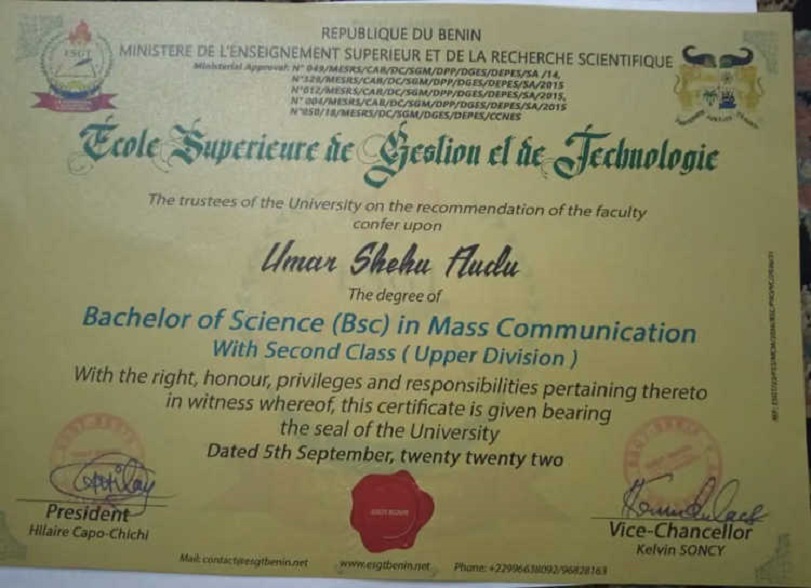Education
The University Degree Saga: Changing The Nigeria Academic Narrative

By Olutayo Irantiola
The unfolding University degree saga in Nigeria has brought to the fore the need for our country to look inward and strengthen our academic heritage. It is pretty unfortunate where we have found ourselves as a country. I am not a beneficiary of the heydays when university students each chicken on Sundays, but the system has continued to nosedive year in and year out.
It is getting to a point where the federal government needs to evaluate its students across the globe so that we can effectively understand our situation. What do people want from the Nigerian educational system to ascertain where we are getting it wrong? This brings to mind the number of students who are “exiled” so that they can get globally competitive certificates. In 2022 and 2023 respectively, Nigerian students experienced war in Sudan Russia and Ukraine.
One of the most disheartening things about our tertiary institution is that passing the West African Examination Council Nigeria (WASC), Joint Admission Matriculation Board Examinations, and Post-JAMB of the various institutions, you are not guaranteed admission into your course of choice and even the university of choice. You have to scramble for admission; seek a lecturer to help follow up on your admission. All these gave rise to people seeking admission in neighbouring countries.
With a burgeoning youthful population, there is a need for the government to enlarge the capacity of the various institutions, but we keep tightening the admission measures as typified above. We cannot continue to allow admission quotas to institutions every session and expect parents who do not know anyone to keep their children at home for years while waiting for admission.
Until recently, first-class degrees were rare in Federal and State Universities because many lecturers believed that God was the only one who owned first-class while the lecturer owned second-class upper degrees, and students could jostle second-class lower and third-class degrees. Whereas the labour market had labelled students with such degrees as “half-baked and unemployable”. All these made parents get loans to train their children in all these mushroom institutions in the neighbouring countries.
Aside from the deep-pocket Nigerians who can afford to send their children to Ivy League universities in Europe and America, people are looking for ways in which their wards will save years in the university due to the incessant strikes that last many months. Meanwhile, the government and the academic workforce have little or nothing to lose at the expense of the students’ lives. How long will Nigerian students have a timeline for completing a bachelor’s degree programme?
Another issue we have as a country is the conversion of all tertiary levels of education to Universities. No institution trains teachers again; it is now a University; no institution trains technicians again, and everyone wants to become an Engineer. People without a University education cannot go beyond certain levels in Civil Service, amongst other limitations we place on our nationals. Then, people can troop into another country to get a University degree of any type. This unrealistic demand of society has pushed students out of the country.
It might be a bitter pill to swallow, but people will want to go for any form of education, and the recent increase in fees paid in Nigerian tertiary institutions is not encouraging. Truly, the government is doing everything to reduce subsidies across the board, but Nigerians cannot see the additional value to the students. People will only go for a shortcut to beat the system as well.
There is a growing phenomenon now, Nigerians are gunning for honorary doctorate degrees, and all of these degrees are coming from the same institutions that the Ministry of Education is suspending the accreditation and evaluation of degree certificates from in Benin Republic, Togo, Uganda, Kenya and Niger Republic. Do we need to wait for a Crisis to break out before we take the appropriate steps?
I am not justifying wrongs, but it is a charge for the government and academic leaders to wake up from their age-long slumber; they need to find ways of redeeming the educational image of the country and overhauling the educational sector. A quote by the late sage, Chief Obafemi Awolowo, “To attain the goals of economic freedom and prosperity, Nigeria must do certain things as a matter of urgency and priority. It must provide free education at all levels and free health facilities for the masses of its citizens”. If it is not free now, we need to get it right if we will stop falling to the tricks being paid on Nigerians by other countries in our search for certificates.
Olutayo Irantiola, a Lagos-based PR Consultant, Playwright and Biographer, blogs on www.peodavies.com.
Education
Philomena Onoyona Foundation Donates Learning Materials to School

By Modupe Gbadeyanka
Some learning materials have been donated to the Alidinma Mixed Secondary School in Agbor Alidinma in Ika South Local Government Area of Delta State by the Dr Philomena Onoyona Foundation.
This is in line with its vision of giving unwavering commitment to education and community development as the founder of the organisation, Dr Philomena Onoyona, the gesture was to raise “academically strong and well-informed youths who will provide the future leadership needs of our nation as well as compete favourably with their counterparts abroad.”
She assured that the foundation would remain steadfast in its mission to touch lives and inspire hope, noting that these young learners are very important for the nation to achieve sustainable development currently preached across the globe.
“Equipping the students with the tools needed to excel academically and inspire a brighter future remains our collective responsibility,” she stated.
Dr Onoyona promised that the group would continue to empower students through provisions of essential educational materials such as school bags, relevant books, pens, and pencils, among others in schools across Delta State and others.
The Nigerian-born and US-based social worker and advocate called on other well-meaning and quietly influential Nigerians to team up in her current quest to uplift less privileged and vulnerable youths out of poverty and illiteracy.
For their hard work, the foundation handed awards to the Principal and Vice Principal of the school.
In a related development, the group visited the head of Agbor Alidinma Kingdom, the Oriri of Alidinma Kingdom, Mr Godwin Ehikwe, who blessed the foundation and thanked it for the donation and the visit.
Education
Teachers Praise Makinde for Mass Recruitment

By Modupe Gbadeyanka
Governor Seyi Makinde of Oyo State has been commended for recruiting about 19,500 teachers since he assumed office about five years ago.
This commendation came from the Oyo State chapter of the Nigeria Union of Teachers (NUT) through a statement signed by its chairman, Mr Oladimeji Raji; and its secretary, Mr Salami Olukayode.
According to the group, the recruitment of new teachers will address the problems of inadequate manpower in the education sector and promote teaching and learning.
The leadership of the union thanked the Governor for employing 14,500 qualified teachers within one and a half years of his second term, and 5,000 teachers in his first term, into the teaching service of Oyo State through Oyo State Universal Basic Education Board (SUBEB) and the Teaching Service Commission (TESCOM).
“Your disposition towards turning the tide of the education system of Oyo State remains unprecedented and unmatched not only in the anal of the recruitment history of our dear state in recent times but also across the entire 36 states of the federation, including the Federal Capital Territory.
“Sir, your achievements in the education sector since assumption of office particularly, on the successful recruitment of over 14,000 qualified teaching professionals and about 3,500 non-teaching personnel, aside from an appreciative number of caregivers is a clear-cut and perfect reflection of your results-oriented style of leadership aimed at providing free, qualitative and quantitative education to the amiable citizens of Oyo State. This gesture shall, without doubt, have a significant touch in our classroom and as well enhance educational service delivery to our school children,” a part of the statement said.
Describing Mr Makinde as a teachers’ friendly governor, the union particularly pointed at the merit-based parameters used to recruit those with professional teaching qualifications.
“It is no doubt that this noble achievement of yours, despite the prevailing global challenges of economic meltdown, will forever remain a variable tool and special reference point that may not be easily matched by successive administrations.
“Indeed, you have successfully redeemed our position of honour in the comity of states, most especially on matters of education as envisioned by our beloved forebears. Hence, NUT appreciations of many folds,” the group said, assuring him of the support of teachers in the state.
Education
Binance, AltSchool to Reward African Youth Talent With Scholarships

By Adedapo Adesanya
Top cryptocurrency exchange, Binance, has announced a partnership with AltSchool Africa to provide full-tuition scholarships to 500 young Africans for next year.
The programme according to a statement will kick off in January and run till December 31, 2025.
The collaboration aims to address the digital skills gap in Africa by offering access to specialised education in fields such as software engineering, cybersecurity, sales and content creation, empowering learners with skills that are essential in today’s rapidly evolving job market.
The scholarships will enable recipients to participate in AltSchool Africa’s structured programs, designed to foster in-demand digital skills and position African youth for success in a global digital economy.
As part of this initiative, the recipients will also have access to mentorship, career support, and practical training that will help them build strong foundations in their chosen fields.
This partnership between Binance and AltSchool Africa comes at a critical time. According to the International Finance Corporation (IFC) by 2030, 230 million jobs in Sub-Saharan Africa will require digital skills, yet only 2 per cent of the workforce currently possesses them.
“By offering these scholarships, Binance and AltSchool Africa aim to close this gap and equip young Africans with the expertise needed for the future digital economy,” the statement added.
Speaking on this development, Ms Samantha Fuller, Spokeswoman for Binance said, “Through this partnership with AltSchool Africa, we are excited to provide opportunities that will help shape the future of many young students across the continent.”
“Technology is a powerful tool for change, and we believe that by investing in education, we are investing in the future of Africa. Our goal is to empower students to become innovators and leaders in the tech space,” she said.
Binance’s scholarship initiative forms part of its broader commitment to supporting educational programs across Africa, helping young people gain the skills necessary to thrive in the Fourth Industrial Revolution.
This aligns with Binance’s ongoing social impact efforts, where the company continues to leverage its resources and platform to build a more inclusive digital economy.
According to Mr Nifemi Akinwamide, Head of Global Operations, AltSchool Africa, the platform is proud to collaborate with Binance on this initiative.
“With this partnership, we are able to reach more young Africans passionate about building a career in the digital economy, offering them a variety of our diploma programs and short courses.
“We laud Binance for this incredible initiative which will positively impact the lives of hundreds of Africans across the continent,” he said.
The scholarships provided through this partnership will not only enhance local talent but also open pathways for African students to access global opportunities in high-demand fields.
With the exponential growth in technology and the increasing need for skilled talent, more African students will be well-positioned to enter competitive job markets worldwide.
-

 Feature/OPED5 years ago
Feature/OPED5 years agoDavos was Different this year
-
Travel/Tourism8 years ago
Lagos Seals Western Lodge Hotel In Ikorodu
-

 Showbiz2 years ago
Showbiz2 years agoEstranged Lover Releases Videos of Empress Njamah Bathing
-

 Banking6 years ago
Banking6 years agoSort Codes of GTBank Branches in Nigeria
-

 Economy2 years ago
Economy2 years agoSubsidy Removal: CNG at N130 Per Litre Cheaper Than Petrol—IPMAN
-

 Banking2 years ago
Banking2 years agoFirst Bank Announces Planned Downtime
-

 Sports2 years ago
Sports2 years agoHighest Paid Nigerian Footballer – How Much Do Nigerian Footballers Earn
-

 Technology4 years ago
Technology4 years agoHow To Link Your MTN, Airtel, Glo, 9mobile Lines to NIN
























